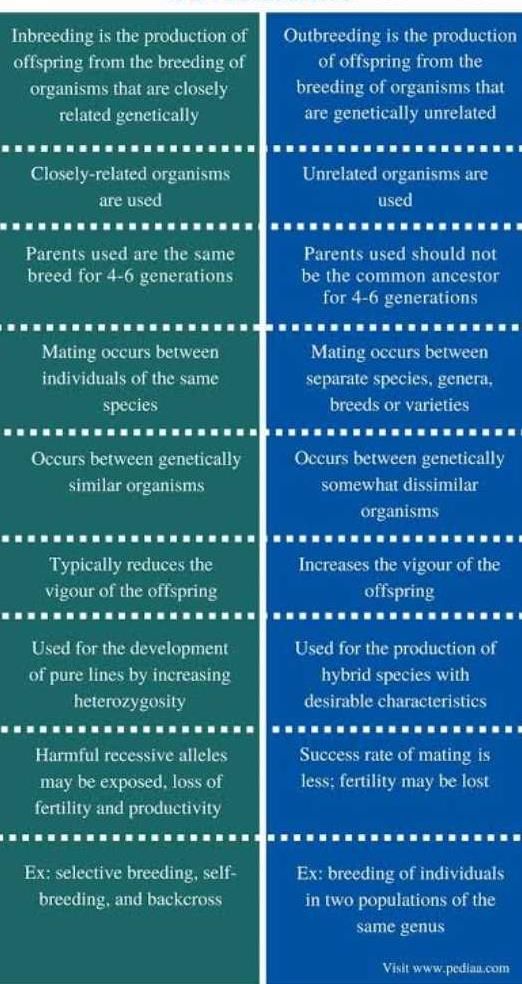NEET Exam > NEET Questions > differences between inbreeding depression a...
Start Learning for Free
differences between inbreeding depression and outbreeding.
? Related: Pollination
Most Upvoted Answer
differences between inbreeding depression and outbreeding. Related: ...

Community Answer
differences between inbreeding depression and outbreeding. Related: ...
Inbreeding Depression vs Outbreeding:
- Inbreeding Depression: Inbreeding depression occurs when closely related individuals breed with each other, leading to a decrease in fitness and overall health of the offspring. This is due to an increase in the expression of harmful recessive alleles, which can result in reduced fertility, lower survival rates, and increased susceptibility to diseases.
- Outbreeding: Outbreeding, on the other hand, involves breeding between unrelated individuals or individuals from different populations. Outbreeding can increase genetic diversity, which can have positive effects on fitness and health. It can lead to hybrid vigor, where the offspring exhibit enhanced traits compared to the parents.
Pollination:
- Definition: Pollination is the process by which pollen grains are transferred from the male reproductive organs of a flower to the female reproductive organs, leading to fertilization and the production of seeds.
- Types: There are two main types of pollination: self-pollination and cross-pollination. Self-pollination occurs when pollen is transferred from the stamen to the pistil of the same flower or a different flower on the same plant. Cross-pollination, on the other hand, involves the transfer of pollen between flowers on different plants of the same species.
- Importance: Pollination is essential for the reproduction of many plant species, as it allows for genetic recombination and the production of seeds. It also plays a crucial role in the production of fruits and vegetables that humans rely on for food.
In conclusion, inbreeding depression and outbreeding have opposite effects on the fitness and health of offspring, while pollination is a vital process for the reproduction and survival of plant species.
- Inbreeding Depression: Inbreeding depression occurs when closely related individuals breed with each other, leading to a decrease in fitness and overall health of the offspring. This is due to an increase in the expression of harmful recessive alleles, which can result in reduced fertility, lower survival rates, and increased susceptibility to diseases.
- Outbreeding: Outbreeding, on the other hand, involves breeding between unrelated individuals or individuals from different populations. Outbreeding can increase genetic diversity, which can have positive effects on fitness and health. It can lead to hybrid vigor, where the offspring exhibit enhanced traits compared to the parents.
Pollination:
- Definition: Pollination is the process by which pollen grains are transferred from the male reproductive organs of a flower to the female reproductive organs, leading to fertilization and the production of seeds.
- Types: There are two main types of pollination: self-pollination and cross-pollination. Self-pollination occurs when pollen is transferred from the stamen to the pistil of the same flower or a different flower on the same plant. Cross-pollination, on the other hand, involves the transfer of pollen between flowers on different plants of the same species.
- Importance: Pollination is essential for the reproduction of many plant species, as it allows for genetic recombination and the production of seeds. It also plays a crucial role in the production of fruits and vegetables that humans rely on for food.
In conclusion, inbreeding depression and outbreeding have opposite effects on the fitness and health of offspring, while pollination is a vital process for the reproduction and survival of plant species.

|
Explore Courses for NEET exam
|

|
Similar NEET Doubts
differences between inbreeding depression and outbreeding. Related: Pollination?
Question Description
differences between inbreeding depression and outbreeding. Related: Pollination? for NEET 2025 is part of NEET preparation. The Question and answers have been prepared according to the NEET exam syllabus. Information about differences between inbreeding depression and outbreeding. Related: Pollination? covers all topics & solutions for NEET 2025 Exam. Find important definitions, questions, meanings, examples, exercises and tests below for differences between inbreeding depression and outbreeding. Related: Pollination?.
differences between inbreeding depression and outbreeding. Related: Pollination? for NEET 2025 is part of NEET preparation. The Question and answers have been prepared according to the NEET exam syllabus. Information about differences between inbreeding depression and outbreeding. Related: Pollination? covers all topics & solutions for NEET 2025 Exam. Find important definitions, questions, meanings, examples, exercises and tests below for differences between inbreeding depression and outbreeding. Related: Pollination?.
Solutions for differences between inbreeding depression and outbreeding. Related: Pollination? in English & in Hindi are available as part of our courses for NEET.
Download more important topics, notes, lectures and mock test series for NEET Exam by signing up for free.
Here you can find the meaning of differences between inbreeding depression and outbreeding. Related: Pollination? defined & explained in the simplest way possible. Besides giving the explanation of
differences between inbreeding depression and outbreeding. Related: Pollination?, a detailed solution for differences between inbreeding depression and outbreeding. Related: Pollination? has been provided alongside types of differences between inbreeding depression and outbreeding. Related: Pollination? theory, EduRev gives you an
ample number of questions to practice differences between inbreeding depression and outbreeding. Related: Pollination? tests, examples and also practice NEET tests.

|
Explore Courses for NEET exam
|

|
Signup for Free!
Signup to see your scores go up within 7 days! Learn & Practice with 1000+ FREE Notes, Videos & Tests.
























